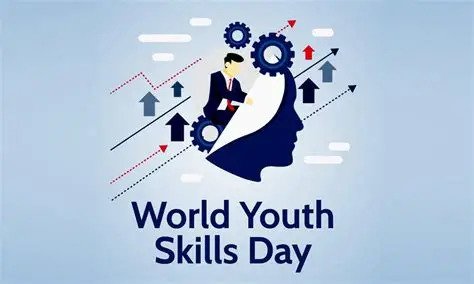World Youth Skills Day: Skill Development for Innovation and Inclusion

Every July 15, the world celebrates World Youth Skills Day. The United Nations General Assembly created this day in recognition of the strategic importance of equipping youth with skills for employment and entrepreneurship.
All young people should have the opportunity to grow as individuals and contribute to our collective global future, regardless of their circumstances or backgrounds.
Theme for World Youth Skills Day 2025
The theme for World Youth Skills Day 2025 is “Youth Empowerment through AI and Digital Skills,” which focuses on integrating artificial intelligence into Technical and Vocational Education and Training (TVET) systems and ensuring equitable access to technologies such as:
- AI-based training
- Virtual reality (VR)-based training
- Career guidance using AI tools
- Curriculum modernization aligned with current labor market demands
However, without systemic reforms, these technologies risk widening the digital divide, particularly impacting marginalized youth who already face barriers to access.
Background
Young people face an unemployment rate that is nearly three times higher than that of adults. NEETs (those Not in Employment, Education, or Training) account for more than 40% of the global youth population.
Young women are disproportionately affected: only 27.4% have access to employment opportunities, compared to 40.3% of young men.
One major cause of structural unemployment is the mismatch between the skills employers need and those the workforce possesses. To address this, World Youth Skills Day 2025 is promoting TVET, with a strong emphasis on skills in artificial intelligence and digital technology.
As such, skills development has become a critical focus of the 2030 Agenda for Sustainable Development, especially Sustainable Development Goal (SDG), which aims to significantly increase the number of youth and adults with relevant skills for employment, decent jobs, and entrepreneurship.
Global Statistics
As we observe World Youth Skills Day 2025, it’s important to acknowledge the challenges that young people continue to face in a rapidly evolving world.
Despite digital transformation and technological advancements, many youth remain economically disengaged, digitally excluded, and unprepared for future workforce demands.
Key figures that highlight the skills and opportunity gaps among global youth include:
- 450 million young people, nearly 7 in 10, are economically disengaged, meaning they are unemployed, underemployed, or not participating in the labor market. This disconnect significantly limits their ability to contribute to economic growth and the achievement of sustainable development goals.
- 86% of students report feeling unprepared to work in AI-driven environments. This indicates a major disconnect between formal education systems and the demands of a rapidly changing labor market where digital and cognitive skills are essential.
- Roughly 90% of young women and girls in low-income countries lack access to basic internet infrastructure and remain offline. This digital exclusion places them at a severe disadvantage in accessing education, employment, and essential services.
- In high-income countries, only 10% of teenagers use digital devices for learning for more than one hour per week. This reflects a continued lack of meaningful integration of digital tools into mainstream classroom education, even in technologically advanced regions.
- Cyberbullying has become a serious threat in the era of online education and social media. Yet, only 16% of countries have enacted legislation to address it. Furthermore, 38% of these laws were implemented only after the COVID-19 pandemic, showing that efforts to ensure online safety for youth have been slow and reactive.
Five Advantages of Technical and Vocational Education and Training
- Increased employment prospects
- Higher income levels
- Greater job satisfaction
- Improved mobility and adaptability
- Promotion of lifelong learning
TVET has been shown to boost motivation, shape a positive attitude, and enhance self-worth. Therefore, young adults should be encouraged to pursue TVET pathways.
Why Is It Important for Youth to Learn Skills?
Acquiring new skills helps young people remain competitive in today’s fast-changing job market. It also strengthens their resilience, builds self-confidence, and supports personal growth.
Equipped with relevant skills, the next generation can drive innovation and make meaningful contributions to their communities. Furthermore, fostering a culture of lifelong learning and promoting equal access to education can help reduce inequality and improve social inclusion.
World Youth Skills Day’s Significance
According to the International Labour Organization (ILO), global youth unemployment, defined as unemployment among individuals aged 15 to 24, reached 15.6% in 2021, more than three times the adult unemployment rate.
World Youth Skills Day serves as a reminder that equipping young people with the right skills should lead to better job opportunities. At the same time, young workers need to stay flexible to keep pace with the evolving job market.
This day also highlights the employment gap between youth and adults, calling attention to the need for targeted solutions.
For NEET youth, we must create a smooth transition from school to the workforce and provide avenues for skill development. This requires enhanced collaboration between youth, TVET institutions, and development partners.
Skills Young People Could Acquire
- Digital literacy: including data analysis, understanding algorithms, and coding
- Entrepreneurship: financial management, business planning, and risk-taking
- Sustainable agriculture: crop cultivation, seed care, and environmental stewardship
- Renewable energy: developing green skills such as wind turbine maintenance and solar panel installation
- Soft skills: problem-solving, critical thinking, teamwork, communication, and adaptability
Conclusion
World Youth Skills Day promotes the development of skills among youth globally, driving innovation, sustainability, and economic growth.
However, achieving this goal requires collective action, such as reforming policies, investing in educational initiatives, creating environments conducive to entrepreneurial learning, and spreading awareness.
Let’s do our part and support the next generation in building a sustainable and prosperous world.





